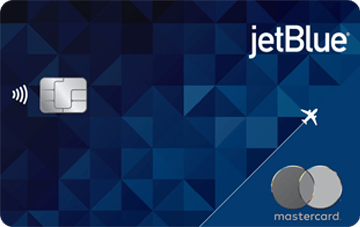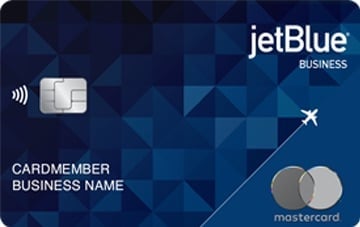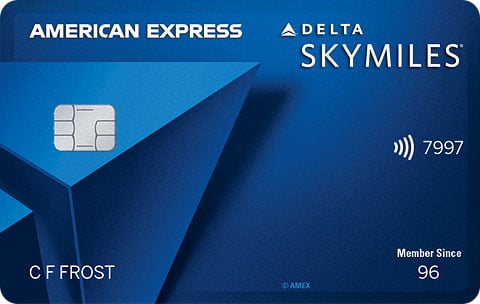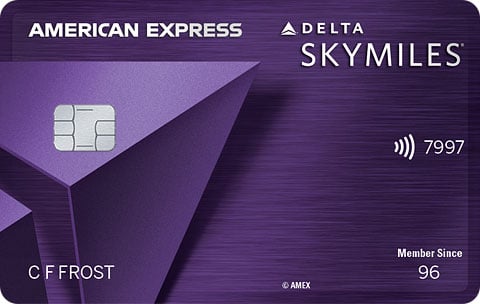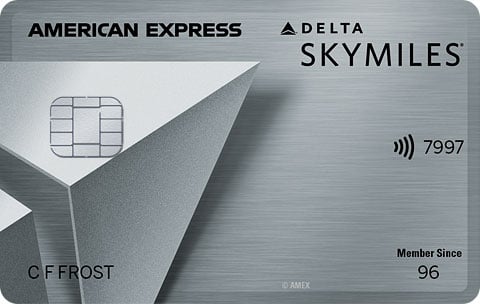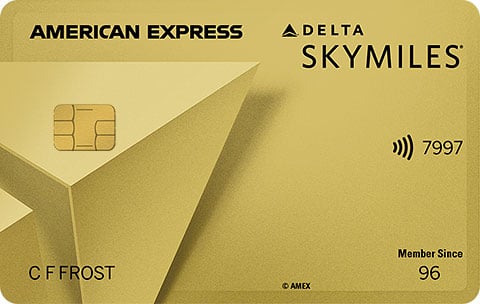JetBlue vs. Delta: Which Is Better?
JetBlue's in-flight experience is good, but Delta comes out ahead.

Many or all of the products on this page are from partners who compensate us when you click to or take an action on their website, but this does not influence our evaluations or ratings. Our opinions are our own.
Nerdy takeaways
- Delta flies to more places in more countries than JetBlue.
- Delta has more airline-branded credit cards than JetBlue, giving SkyMiles members more opportunity to earn miles through everyday spending.
- JetBlue serves Northeast-based travelers well given its large network from cities like Boston and New York, mostly domestically and down the East Coast.
In our analysis, Delta Air Lines comes out ahead of JetBlue Airways with its extensive global network, SkyTeam alliance and co-branded credit card options. Still, JetBlue has its own strengths, especially for Northeast-based travelers who value its strong East Coast presence.
Understanding the notable differences between their route maps, fees and loyalty programs can help you decide the airline that is best for you.

By signing up, you will receive newsletters and promotional content and agree to our Terms of Use and acknowledge the data practices in our Privacy Policy. You may unsubscribe at any time.
Routes and destinations
Your top airline needs to fly where you want to go, either using its own aircraft or partner airline flights.
Winner for the most destinations: Delta
Delta flies to more places than JetBlue, making it the winner for geographic presence. Delta also is a founding member of the SkyTeam alliance, which has several member airlines. By relying on its partners, travelers can fly Delta or an affiliated carrier to cities on six continents.
JetBlue
JetBlue’s route network focuses mostly on the continental U.S., with its international destinations extending to the Caribbean, Central America and South America.
It has also expanded to serve destinations like Paris and Madrid, as well as Halifax and Vancouver, Canada. In total, JetBlue offers flights to more than 100 destinations on both sides of the Atlantic Ocean.
Delta
Delta flies to nearly 300 destinations in more than 50 countries. The SkyTeam alliance grows the destination list to more than 1,000 in over 160 countries, which is a great deal if you want to earn or spend some SkyMiles.
» Learn more: The best airline this year
Reliability
Travelers want to fly on schedule and with their bags. That’s why on-time flight and lost luggage statistics can be helpful.
Winner for most reliable airline: Delta
Delta had the highest reliability score of the nine carriers analyzed by NerdWallet, receiving a rating of 4.7 out of 5 during the period from July 2023 to June 2024. JetBlue received the second-lowest rating at 2.2.
JetBlue
Only 68.65% of JetBlue's flights were on time, and 1.93% were canceled. Its tarmac delay numbers were also not impressive, with 0.99 flights out of every 10,000 having to wait on the apron before takeoff.
JetBlue did slightly better on delayed or missing checked bags, with 0.43% of JetBlue’s checked bags not arriving as planned.
Delta
Delta led the pack, having the most on-time departures at 83.83% and a flight cancellation rate of 0.83%. The airline experienced tarmac delays of 0.54 flights out of every 10,000, putting it ahead of JetBlue’s score.
It has improved its bag handling slightly, with 0.42% of bags arriving late or not at all.
» Learn more: What to do if an airline loses your luggage
Fees
Finding a low fare can be easy, but don’t forget about those extra fees that airlines like to charge. Many of these fees can be waived by having an airline co-branded credit card or holding elite status with the carrier.
Winner for the lowest fees: JetBlue
We think this one could be close. While both carriers charge fees, they have carve-outs for elite status members or credit cardholders. They also allow free bags on long-haul international flights.
JetBlue
JetBlue doesn’t charge fees for seat selection (except for Blue Basic, its basic economy fare). JetBlue may not be ideal if you want to check bags as it tops the fees for those ($35 for the first bag on a domestic flight and $50 for the second).
This requires adding the bag to your reservation at least 24 hours before departure. But, during peak travel periods, JetBlue raises the fees to $40 and $60, respectively.
Bags added within 24 hours of departure cost $45 for the first bag and $60 for the second (or $50 and $70, respectively, during peak periods).
A free checked bag comes with Blue Plus fares or if you are a JetBlue Plus Card or JetBlue Premier Card holder. Mint passengers and Mosaic elite status holders can check two bags for free (except for Mosaic 1 elites, who only get one free bag). Those on international itineraries between the U.S. and the U.K. or Europe also receive one free checked bag — except for travelers in basic economy.
Delta
Delta also offers free seat assignments to all but basic economy fares, but this is only for a select number of seats. Basic economy passengers receive a free seat assignment at the gate.
Delta charges $35 for the first checked bag ($45 for the second), but those with Medallion elite status, most co-branded credit cards and certain premium fares do not need to pay at all.
» Learn more: Which airlines have the best (and worst) fees this year?
Loyalty program
A loyalty program rewards travelers for doing business with the airline and allows them to earn miles toward future travel and elite status for improved benefits. Credit cards can also help with accumulating miles and status.
Rewards rate
The rewards rate is based on how many miles you accrue per dollar spent as well as the value of those miles.
Winner for the highest rewards rate: JetBlue
This one is easy. Delta charges high rates for its mileage redemption tickets, strongly affecting their value. JetBlue offers more value. JetBlue TrueBlue members receive 7.3% back for each dollar spent, while Delta SkyMiles members get 5% back. JetBlue provides the second-highest return on spending (after only Alaska Airlines' Atmos Rewards), while Delta is toward the bottom of the pack.
JetBlue
When using TrueBlue points for award travel, you'll receive 1.4 cents per point in value.
To rack up points, you can typically earn 3x points on base airfare as well as extra points for holding elite status, using a JetBlue credit card and booking online at JetBlue’s website. Those bonus multipliers can add up to 15x points per dollar spent on airfare.
Delta
Delta SkyMiles program members fare worse when using their miles. For award travel, the general value is only 1.2 cents per SkyMile.
You will typically find more value when using miles for international flights on partner airlines than on Delta flights. The more miles you earn, the more you can spend. Main Cabin flights and above earn 5 SkyMiles per dollar, and there are bonuses (with the highest Medallion elite status earning 11 miles per dollar).
» Learn more: How much are travel points and miles worth this year?
Credit cards
By choosing a co-branded credit card from your preferred airline, you can enjoy a better travel experience when you fly with the airline. Perks include bonus miles on airline purchases and some other bonus categories, free checked bags, accelerated paths to elite status earning, priority boarding and in-flight discounts.
Winner for the best credit cards: Delta
Delta wins this title, too, because it has more associated credit cards, and they tend to offer more benefits when compared with JetBlue’s.
JetBlue
JetBlue has four co-branded credit cards for U.S.-based members — three personal and one business. The basic JetBlue Card has a $0 annual fee. The JetBlue Plus Card has a $99 annual fee. And the brand-new JetBlue Premier Card has a $499 annual fee (and an extra $150 for each authorized user) and includes lounge access.
With all of these personal cards, you can save 50% on in-flight purchases while avoiding foreign transaction fees. The JetBlue Plus Card and the JetBlue Premier Card come with one free checked bag for the cardmember and up to three travel companions. An annual points bonus is another nice perk with both cards, as well as a 10% rebate on redeemed points on JetBlue flights.
JetBlue cards
Still not sure?
Delta
Delta has a whopping four personal and three business credit cards. These cards have different fees and benefits, and it is up to frequent Delta travelers to choose the one that best matches their spending and travel preferences.
The Delta SkyMiles® Blue American Express Card has a $0 annual fee, and it is the only one that does not include one free checked bag or priority boarding. It does include in-flight discounts. There is also a 15% discount on the number of SkyMiles needed for an award trip.
The Delta SkyMiles® Platinum American Express Card and Delta SkyMiles® Reserve American Express Card come with an annual companion ticket, which can be a valuable perk. The Delta SkyMiles® Reserve American Express Card provides free access to Delta Sky Clubs and Centurion Lounges when flying Delta.
Terms apply.
Delta cards
Still not sure?
Elite status program
Frequent travelers seek out elite status so they can enjoy additional benefits and recognition on their trips. It is a nice reward to those who spend the most with an airline, with benefits like complimentary upgrades and bonus miles.
Winner for the best elite status program: Delta
NerdWallet studied both airlines’ elite programs to analyze which one is better for frequent travelers. Delta received a score of 4.8 out of 5 vs. JetBlue’s score of 3.4. This score considers the perks at each level and the cost required to earn that elite tier. Delta is the clear winner.
JetBlue
JetBlue has the Mosaic elite status program. There are four levels of Mosaic starting at Level 1, which is reached after earning 50 tiles, based on spending on JetBlue flights, vacation travel packages and JetBlue credit cards. The highest is Level 4, which is reached after earning 250 tiles.
The benefits grow from priority boarding, seat upgrades and free checked bags all the way up to Mint upgrades and a pet fee waiver.
Delta
Delta continues to evolve its Medallion program, which awards higher tiers based on how much you spend with the airline and its partners. Like JetBlue, it has four elite status levels, ranging from Silver to Diamond. Silver requires earning 5,000 Medallion Qualification Dollars through travel spend with Delta, Delta partners, its vacation packages or through co-branded credit cards.
Among the perks that Delta Medallion elite members can look forward to are complimentary upgrades, priority boarding, waived baggage fees and Choice Benefits perks like Delta Sky Club membership, Delta travel vouchers and the ability to gift elite status.
Business class
Whether you're flying across the United States or across an ocean, business class offers an enhanced flying experience. For JetBlue and Delta, their longest flights come with lie-flat seats, premium dining and beverage offerings, and more privacy.
Winner for the best business class experience: Tie
JetBlue and Delta offer excellent business class products. While Delta has the advantage of offering more flights with business class to more destinations, it also has a range of products, making it hard to know what to expect.
On some planes, the seats are in a 2-2 configuration; on others, they have direct aisle access. Some flights even have doors on the suites, but the variability can be confusing. JetBlue has a more uniform product but only on select routes. For this reason, it’s a tie.
JetBlue
JetBlue Mint offers lie-flat seats on select flights within the U.S., to destinations in Latin America and the Caribbean and on all transatlantic flights. The airline no longer guarantees that the sliding door can be used due to Federal Aviation Administration regulations on some flights. Those with Mint Suites and Mint Studios offer more space, too.
Delta
Delta One is Delta’s most premium business class offering on long-haul international and some U.S. transcontinental flights. Perks include priority boarding and complimentary access to Delta Sky Club or Delta One lounges on passengers’ day of travel.
» Learn more: The best business class airlines
JetBlue vs. Delta recapped
In a battle between JetBlue and Delta, the overall winner is Delta. Delta flies to more places than JetBlue and belongs to a global alliance. The sheer number of options outclasses JetBlue any day. But the real proof comes from Delta’s improved reliability when it comes to on-time departures, fewer cancellations and airport ramp delays.
Delta has more co-branded credit cards that give travelers more ways to earn miles toward elite status, and they come with perks like companion certificates.
JetBlue serves as a niche carrier, mostly in the U.S. and to the Caribbean and Central America (and now some cities in Europe). But it cannot match the power of a global airline like Delta.
How to maximize your rewards
You want a travel credit card that prioritizes what’s important to you. Here are some of the best travel credit cards of 2026:
- Flexibility, point transfers and a large bonus: Chase Sapphire Preferred® Card
- No annual fee: Wells Fargo Autograph® Card
- Flat-rate travel rewards: Capital One Venture Rewards Credit Card
- Bonus travel rewards and high-end perks: Chase Sapphire Reserve®
- Luxury perks: American Express Platinum Card®
- Business travelers: Ink Business Preferred® Credit Card
Article sources
NerdWallet writers are subject matter authorities who use primary,
trustworthy sources to inform their work, including peer-reviewed
studies, government websites, academic research and interviews with
industry experts. All content is fact-checked for accuracy, timeliness
and relevance. You can learn more about NerdWallet's high
standards for journalism by reading our
editorial guidelines.
More like this
Related articles


